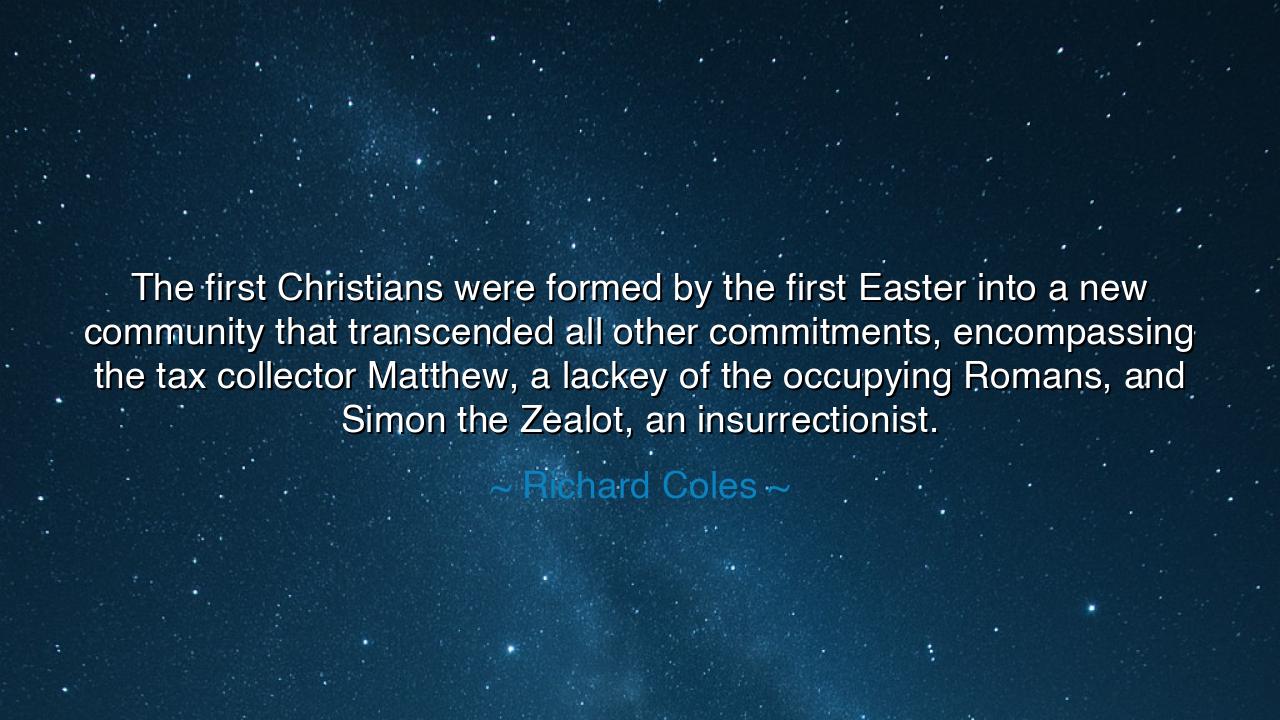
The first Christians were formed by the first Easter into a new
The first Christians were formed by the first Easter into a new community that transcended all other commitments, encompassing the tax collector Matthew, a lackey of the occupying Romans, and Simon the Zealot, an insurrectionist.






The words of Richard Coles—“The first Christians were formed by the first Easter into a new community that transcended all other commitments, encompassing the tax collector Matthew, a lackey of the occupying Romans, and Simon the Zealot, an insurrectionist”—speak with the resonance of ancient truth. They remind us that from the very beginning, the power of faith was not in uniformity, but in unity. The miracle of the Resurrection, that first Easter, did not merely proclaim life over death—it proclaimed love over division. It brought together those who would never have stood side by side under any other banner. In those early days, the Church was not a fellowship of the like-minded, but a gathering of the transformed.
To understand this, one must remember who these men were. Matthew the tax collector was despised by his own people. He served the Romans, collecting taxes for the empire that crushed Israel under its heel. To the common man, he was a traitor, a man who profited from the suffering of his brothers. Simon the Zealot, by contrast, was his opposite—a fierce nationalist, sworn to resist the Roman oppressor even unto death. Yet both of them were called by Christ, and both were remade in the fire of Easter’s dawn. In that single act—the joining of the servant of empire and the rebel of faith—the spirit of the early Christian community was revealed: a brotherhood that transcended politics, tribe, and pride.
Coles’ words remind us that the first Easter was not merely a historical moment, but a revolution of the heart. It shattered the walls that divide man from man. In a world ruled by hierarchy, fear, and vengeance, it birthed a community bound by grace. Those who had once hated one another shared bread; those who had once wielded the sword learned to forgive. The Resurrection was not only the victory of God over death, but the victory of love over human separation. The followers of Christ did not simply believe in a risen Lord—they lived as if resurrection itself had entered their souls.
The origin of this truth lies in the very essence of Christ’s ministry. He did not gather around Him the wise, the noble, or the powerful. He gathered the broken, the lost, and the opposed. He built His Church not on sameness, but on reconciliation. His disciples were fishermen and scholars, dreamers and doubters, zealots and servants. The miracle of their fellowship was not that they agreed, but that they loved. They did not erase their differences; they transcended them in service to something greater—the kingdom of heaven, which knows no boundaries of nation or creed.
History bears witness to the enduring echo of this truth. In every age, the Church has been tested by division—by class, by race, by ideology. Yet when it has returned to its roots, it has rediscovered its power. Consider the civil rights movement in America, led by those who drew strength from their faith. In the churches of Montgomery and Birmingham, black and white, rich and poor, the humble and the educated gathered to pray, to sing, and to march for justice. They embodied the same spirit that joined Matthew and Simon—the belief that love of neighbor is stronger than the walls built by men. From that unity rose a moral force that shook empires, just as it did two thousand years before.
The lesson that Coles offers is this: true community is not built by agreement, but by transcendence. To live in the spirit of Easter is to see the divine image in those we oppose, to break bread with those we mistrust, to forgive those we once condemned. The resurrection of Christ is meaningless if it remains a tale of the past; it must rise anew in our hearts every time we choose reconciliation over resentment, understanding over pride. The world today is filled with divisions no less fierce than those between Matthew and Simon. Yet the call remains the same—to build a kingdom not of ideology, but of love.
Therefore, let these words of Richard Coles stand as both reminder and challenge. The first Christians did not find unity by erasing their differences, but by kneeling together before a truth greater than themselves. So too must we learn to see one another not as enemies or strangers, but as companions in the divine journey. For when we live as they did—when we forgive, when we reconcile, when we love beyond reason—we become what they became: a community reborn from the light of the first Easter, a people no longer divided by the world, but united by the eternal.






AAdministratorAdministrator
Welcome, honored guests. Please leave a comment, we will respond soon